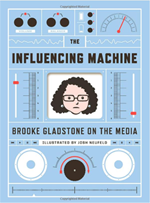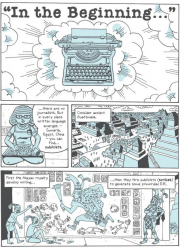How to understand the media (Review of The Influencing Machine)
 We often talk about "the media" as if it were as singular monolithic thing, which it isn't. There are many forces working independently of each other. When combined we experience them all as a unified thing, but it isn't truly singular nor unified in any way. Any argument about media that includes the phrase "the media" should be stopped. It's conveniently assuming something about the world that isn't true.
We often talk about "the media" as if it were as singular monolithic thing, which it isn't. There are many forces working independently of each other. When combined we experience them all as a unified thing, but it isn't truly singular nor unified in any way. Any argument about media that includes the phrase "the media" should be stopped. It's conveniently assuming something about the world that isn't true.
This bias we have towards constructing easy targets to argue about is one of our greatest problems with understanding media. When you stop and avoid saying "the media is…" you're forced to think more carefully about what you're really upset about and what the real causes are.
If you want to get past your pet biases and better understand how media works, the book The Influencing Machine, by Brook Gladstone (of NPR) is a good place to start.
 It's a graphic book, illustrated well by Josh Neufeld, which means it's a combination of comic like panels, mixed with short essays. I like this style of book when it's done well (this one is), but it's not for everyone.
It's a graphic book, illustrated well by Josh Neufeld, which means it's a combination of comic like panels, mixed with short essays. I like this style of book when it's done well (this one is), but it's not for everyone.
The strengths of the book are its telling of (U.S.) media history. It explores the problematic origins of journalism, how the early press in the U.S. developed (which is shockingly familiar to many who complain about modern journalism), and the inherent good and bad challenges it has wrought throughout our history. Some stories I knew, but others were launching points to research online. Brookstone takes the position that we are a large part of our sense of "media", as we make choices about what we read, how we read it and the questions we choose to ask or not. She also explores the challenge of objectivity, and challenges the notions most people assume about the objectivity of what the read and hear.
The weaknesses of the book are twofold. First, if you've studied media theory and cognitive bias, you'll be on familiar turf. Second, the last quarter of book switches into future thinking, and here Brookstone is on weaker ground. The book is stronger in its telling of history and Brookstone's insightful view of how media has functioned, rather than her looking to the future. It'd also be easy to criticize the book for a having a mild liberal tilt, as some negative examples come at the expense of (in)famous Republicans/Conservatives.
The book lightly touches on social media's impact, which is fine. But it is notable Brooke doesn't appear to have a twitter account (I couldn't find it). However Josh Neufeld does.
It's a fast read as most good graphic books are, and will definitely improve how you think about media in all its forms.
Related posts:Crap detection 101 and social media
Wednesday linkfest
ArtofPM on Business Week
Calling bullshit on social media
Help wanted: Editor/Curator for my next book



